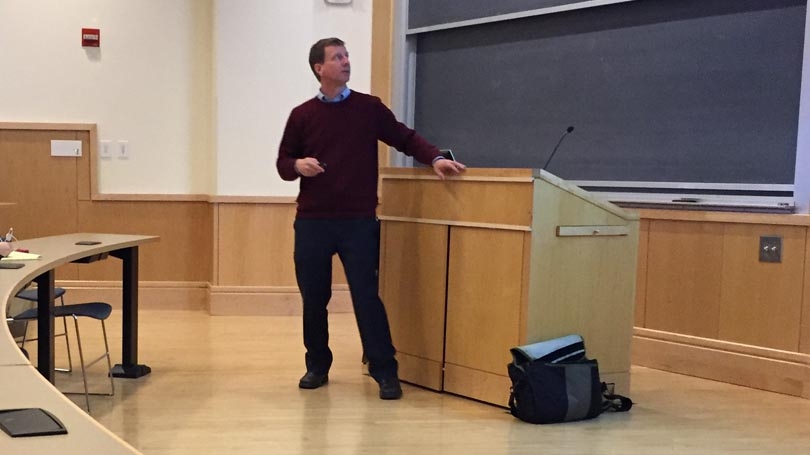
Dean of the School of Graduate and Advanced Studies, F. Jon Kull, leads the first Becoming Faculty workshop series (Photo by Kerry Landers)
F. Jon Kull, Professor of Chemistry and Dean of the School of Graduate and Advanced Studies, shared his experiences and advice during Friday's workshop, "How to Present Your Research", the first in the "Becoming Faculty Series".
With an audience of about 40 students, graduate and postdoctoral alike, Dean Kull gave a self-described "bad talk about giving good talks" that addressed useful PowerPoint presentation skills, the dos and don’ts of presenting, and other important recommendations audience for presenting research to a general audience and/or at faculty job interviews.
In the first section of his talk, Dean Kull focused on the planning and preparation stages of giving a research presentation. Knowing your audience, he says, is key to preparing appropriately. Whether it is a conference or faculty job interview you are presenting your research for, knowing who you will be addressing will influence the amount and content of information you will give, as well as how you organize and present it. "You want people to leave your talk with a story, not too much information," he advised. The goal of your presentation, he says, is to tell a story with your research: What did you want to find out? How did you search for answers? What results did you get? Why is the research important?
As for PowerPoint aesthetics, Dean Kull strongly opposed filling a slide with too much information. Instead, utilizing space, easy to read font, appropriately sized images, and bullet points are more pertinent to engaging your audience with the information you want them to understand. A laser can come in handy when you wish to direct your audience with and to prompt specific points on the projector screen – it also keeps them awake and engaged. Other useful tools include arrows that point to parts of an image or graph, pop-up captions for figures, and animations that guide your audience through your talk.
The use of colorblind simulators has also helped researchers and students engage with and reach out to a wider audience. Dean Kull recommended checking your presentation to see if colors you use are appropriate for audience members with color-blindness or other color deficiencies. Websites such as Colblindor and apps like Chromatic Vision compares images in normal, monochromatic, dichromatic, and trichromatic lens and helps you to determine which colors to change to meet the needs of your audience. Three physical science graduate students at the talk expressed interest in using colorblind simulators on their presentations and publications.
Dean Kull's third point stressed the importance of practicing the talk before the big day. "Don't practice with your significant other or best friend," he advised jokingly. A fellow student in your discipline can help point out flaws or gaps in your talk. After the practice talk, polish your presentation – check for typos, format images and text, and ensure your slides transition well.
On the day of your research talk, be mindful of your appearance and poise; try not to fidget but move around occasionally to keep yourself and your audience focused. Dean Kull's key reminders were to slow down, sip water, not to read your slides, keep to time, and make eye contact. "It is also impressive to use the board when you can because it shows your audience that you can think on your feet and go off the script to further convey your point," especially for faculty job interviews where your ability to present your knowledge outside of the prepared presentation can impress your interviewers.
For both students and faculty, it is never a waste of time to save your file(s) on your computer and to back up with an external drive should the venue not be supplied with internet connection. "Bring extra cords, batteries for your laser or mic, and memory sticks," and prepare for the worst. After your talk, ask for constructive feedback from your peers and advisor(s), and write down questions from the audience for further investigation.
As with all accomplishments, do not forget to acknowledge those who have supported you and contributed to your work. Failing to do so or under-acknowledging can shatter relations and future collaborations.
Assistant Dean of Graduate Student Affairs, Kerry Landers, organized this and upcoming talks for the "Becoming Faculty Series". The next event, "Getting and Negotiating an Academic Job Offer" will be held on Friday, January 20, 2017 and will be presented by Professor of Biological Sciences and Associate Dean of the Sciences, Elizabeth Smith. In this talk, Professor Smith will explain the hiring and negotiating process for new faculty members. For future talks in this series, please register at the LibCal calendar site.